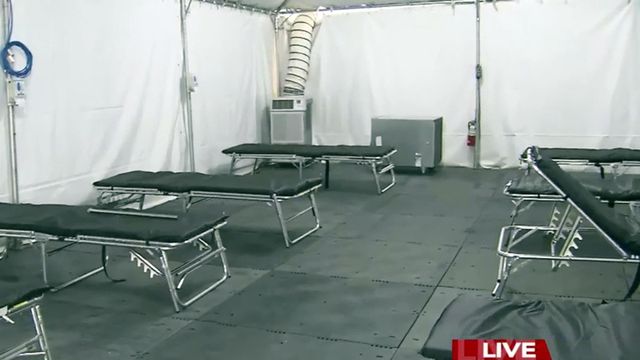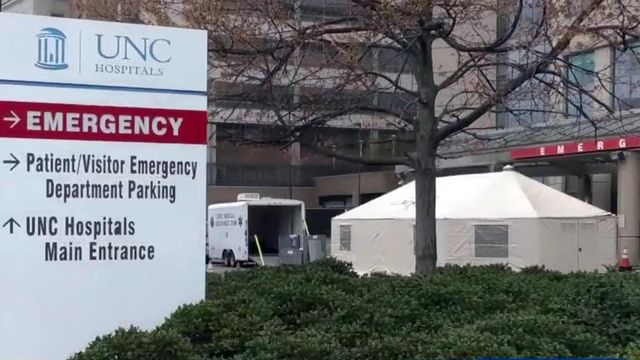Duke, UNC hospitals to use tents to keep virus patients separate
Doctors say a crucial aspect in stopping the spread of coronavirus is separating patients at hospitals, keeping distance between those suspected of having the virus and those there for other reasons.
Tents have become the go-to way for solving that problem.
Duke Regional Hospital erected four tents Thursday outside its emergency room to handle patients suspected of having COVID-19, the illness associated with the virus.
"At this point, I think it’s kind of preparing for the unknown [that] is the biggest challenge," said Zachary Cockerham, the emergency department's nurse manager of operations. "The sooner we can get them up, the sooner we can plan and have safety measures in place."
Patients coming to Duke Regional will be screened by a medical professional before ever getting out of their cars, Cockerham said. If they don't have respiratory symptoms, they will be directed to the main ER. If they are suspected of having COVID-19, they will go to the tents for evaluation.
"We will do intake screening here. Patients who are deemed stable after being evaluated by a provider and other clinical staff will be discharged from here. Patients requiring further treatment will be moved to a care area inside our emergency department," he said.
The hospital doesn't intend to use the tents for any kind of long-term treatment, Cockerham said.
UNC Hospitals in Chapel Hill started seeing patients Wednesday at tents set up there, and Duke University Hospital also has tents set up. UNC Rex Hospital in Raleigh plans to erect a tent on Friday.
UNC has the capability to test for the virus, while Duke hopes to have a test available by next week. For now, staff at the two Durham hospitals will take samples from patients and send that off to a lab for testing.
The tents could help prevent a surge of patients will overwhelm the health care system.
Dr. Joseph Rogers, chief medical officer for the Duke University Health System, said such a surge is a major concern of health care officials during the outbreak.
People can do their part to help health workers and facilities by practicing social distancing and seeking in-person medical care only when necessary, Rogers said.
"It's very important to heed the warnings we're giving about social distancing, about trying to minimize contact and about not going to work when you're ill," he said in a Wednesday phone interview. "We need to blunt the curve."
Rogers said he has already noticed a difference at Duke University Hospital.
"Life in the hospital has certainly changed over the last couple weeks," he said. "We have begun to prepare for what we're worried may be a surge of patients coming into the hospital with COVID-19."
Rogers emphasized it's hard to know how many people will be diagnosed with COVID-19 in the United States in the coming weeks and how many will need to be hospitalized.
"We're monitoring this on a daily basis," he said. "We want to make sure we have the capacity to see patients who are concerned about the possibility of having COVID-19 and need emergency care."
Visitor restrictions are currently in place at Duke medical facilities, and patients are being asked to call physicians first if they don't need emergency care.
COVID-19 tests are still difficult to come by, Rogers said, but Duke staff are constantly monitoring their availability.
"We are watching the supply chain very closely, and I think that all of us have recognized that there is an incredible pressure from across the country for medical supplies," Rogers said. "We feel today that we're well-positioned to take care of the patients who need us, but we're watching this on a daily basis."
In the meantime, he asked that people limit contact with others, wash their hands well and avoid touching their face to slow the progression of the disease.











